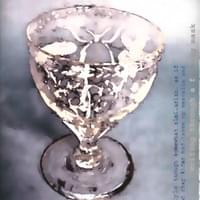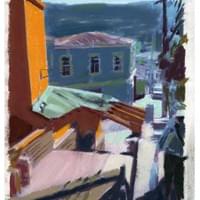
The Deception Glass
A novel
In Georgian times, the host of a drinking party might use a deception glass. This vessel would appear to be the same size as those used by his guests, but thickened glass to the sides or base would reduce the capacity of the receptacle. Thus, less drink was taken with each freshly charged toast, and the host was able to lead the festivities with a clear head, while those about him lost theirs.
How it Began

Chapter One
Confitería Ideal, Buenos Aires. Evening, Thursday, 26th November.When I pictured a Buenos Aires tango hall, this is it: elegant, smoky, decadent. However, the person I want to be, within this scene, is a sophisticated, Paris-frocked woman, sipping her daiquiri. Not a terrified coward hiding in the shadows. I can’t even get a waiter’s attention – what a mess. Still, my phone has no signal, no-one knows how to find me, and living in Argentina beats His Majesty’s Prison Holloway, hands down.
Confitería Ideal has two triple-height floors: a once-grand café below, and this ballroom at the top of a marble staircase. Panelled in dark wood, it is softened by gentle moons of gold light illuminating framed black and white photographs of dancers. Given what my mother, Mutti, said before she died, I’d hoped that the old photo I’m searching for would be one of them, but no luck, and my nerves are shredded.
Why am I so nervous? The photo, if it still exists, is over thirty years old: a record of my family’s past. I just think, hope, that it’ll make the present more bearable.
Get a grip: I’m holding the daiquiri; I’m wearing the French dress. I can pretend to be sophisticated – an act that’ll be destroyed if I attempt to tango, it’s been too long.
Seated in a dark corner, I must avoid any eye-contact before a new tanda of music starts, then I’ll besafe and can enjoy the spectacle. The formality of the cabeceo is terrifying; the men scan the room, eyes moving into all hidden corners like laser beams. Their aim is to catch the eye of an intended dance partner; a discreet nod and the deal is done.
I’m in no immediate danger; it’s the final tango class for tourists. A couple break away, the man limping, and sit beside me. For him, misery glistens amid his sequinned lycra, while she, large and strong-of-jaw, is dressed for a 1920s Pigalle brothel.
“Do you not dance?” She is magisterial, and North American.
“Yes, but not today.”
“Then why are you here?” She frowns, her neck quivering.
Aiming to placate, I point at the thirty-year-old travel sketchbook on my table.
“I’m using this to play detective with my parents’ history – we werehere, in this ballroom, when I was little."
Although nodding, the woman’s eyes are not engaged.
“I was also here before, with my first husband, Don. He was anexcellent dancer…’
I nod, calming down. Although I feel out of depth on my own, it’s going to be fine. A couple of days in a glamorous city, a light treasure-hunt, then onto the beach to relax after the nightmare of this last year. Yes, please. I look at the sketchbook page which suggests that somewhere in this city there is a renowned photo of my father:
Travel Sketchbook: Wed, 25thNov. 1987 (Google translation from German) Paul was honoured today by famous photographer Rombo in this iconic photo from 1970s. Paul is still a little celebrity, although I wish him known for another fact! Now Rombo has a tango photo proposal for tomorrow, in Confiteria Ideal, that I agree.
The one thing I’d never possessed, but always wanted, was a photo of my father – to know what he looked like, to know anything about him. Now, more than ever, I’m desperate to recognise other genes in myself, aside from Mutti’s. The internet gave me nothing about Rombo except that he’s a big deal in Buenos Aires. So, here I am, on the hunt for a photographer and his work.
My sight has sharpened since my little nervous breakdown: lights fizz and colours pop. I watch the tourists dance, they are easily distinguished from thelocals: unless learnt from the cradle, tango looks stiff and ugly. Light falling from the chandeliers above highlights the dancers frozen with stress, mannequins in glittering clothes. Arms and legs rigid, they glide as though on casters. Reaching the edge of the dancefloor, the men halt, turn their partner and, lifting a foot, inspect the sole, as if they had trodden in dog faeces. It’s a travesty of a move they learnt earlier.
I zone back to the American woman.
“… retracing our steps. I sense Don everywhere; his aura is magnificent. This is the city where his soul left his body. One moment he was there, enjoying a steak, then he collapsed. Although everyone kept trying to revive him, I saw his spirit leave. Such an intense moment, so spiritual.”
And she knew the exact moment his soul left, like some genie from a bottle?
“New Age poppycock.” I look at the woman, appalled I’d said that out loud, as the husband snorts with laughter. “I’m so sorry.” She’s bristling with fury, understandably.
But I didn’t know, althoughI’d been staring at Mutti for hours.
I’d used a makeup mirror, under Mutti’s nose, to check if it misted up and she was still breathing. Such an odd thing to do. The idea came from an old film. Audrey Hepburn horrified, in church, as hitmen checked her murdered husband was dead. The first thug did the mirror trick, after which a second jabbed a pin into the body.
I’d never have stuck a pin into Mutti, that was inconceivable. Imagine my horror if her eyes flew open.
The Note
“My Dear Girl, the word is BOUGH. It is a bastardisation
of a poem called In a Station of the Metro: ‘The apparition
of this face in a crowd, petals on a wet black bough’.
And, although I cannot approve of notes being sent to
unaccompanied women in bars, if it must be done,
Ezra Pound’s imagist phase is most suitable. By the way,
if it is of any relevance, it should be plural, ‘faces’, but I
suppose that would spoil the objective. " The Professor
The Map

.
Contact
Social Feed
Check out my latest updates!

















